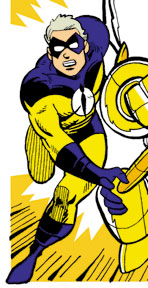As I say, the nomination was unexpected, partly because I had no idea my work was being considered but mostly because I never thought of Mom's Cancer as a young adult book. I can certainly see how that could work, though, and in fact young adult literature includes some of the best writing and most challenging concepts around. I have a ton of respect for the field; I just didn't realize I was in it. I also think there are many readers whose first instinct when seeing comics in a book is to think "kids' stuff." I noticed that Jessica Abel's La Perdida, R. Kikuo Johnson's Night Fisher, and The 9/11 Report: A Graphic Adaptation also made the first cut, and I don't think of them as particularly young adult titles, either. Maybe I need to expand my concept of "young adult."
The other curiosity is that Mom's Cancer got listed as fiction. Trust me, it's as non-fictional as I could make it. I wonder if the ALA was thrown off by some of my metaphorical choices, like the superheroes. I'm reminded of a story about Art Spiegelman's Maus, when the New York Times was trying to decide if it should be listed as fiction or non-fiction. As I recall the tale (no doubt inaccurately), an exasperated editor finally said, "Go knock on Spiegelman's door. If a giant mouse answers, it's non-fiction."
If anyone knocks on my door, I'll be sure to have my yellow superhero tights on.


1 comment:
I gave "Maus" to a teen or two when it came out, and if I had nieces and nephews over 12, they'd be getting "Mom's Cancer," too. While it's not a "kid's book" and there's something perhaps dismissive in assuming that graphic novels/memoirs are inherently childish, there's also the idea that putting difficult concepts in an accessible form is pretty valuable.
Mind you, I may not be entirely objective: I've kind of built a job around the notion that kids are bright enough to handle difficult concepts in an accessible form.
Post a Comment